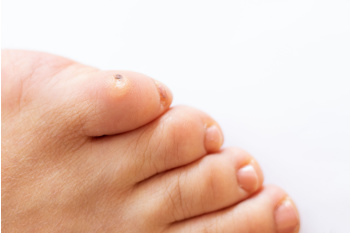
When rheumatoid arthritis affects the feet and ankles, it can lead to progressive joint damage and deformities that interfere with basic movement. Pain, stiffness, and swelling commonly develop in the toes, midfoot, and ankles, often affecting both feet. Patients may experience bunions, claw toes, or hammertoes, making walking painful and forcing changes in gait. In advanced stages, the arches may collapse, or bumps may form along the midfoot, which can make wearing shoes painful. If medication does not adequately manage the foot or ankle pain, a podiatrist may recommend surgery. Common procedures include arthrodesis, which is a fusion of bones after removing damaged joint surfaces, and arthroplasty, which is a partial or total joint replacement. Fusion is especially common in the hindfoot and midfoot, where it can restore stability and reduce deformity. In the forefoot, surgery may straighten or reposition the toes. Ankle procedures include joint fusion or replacement, depending on the extent of damage. If you have foot pain related to arthritis, it is suggested that you schedule an appointment with a podiatrist for appropriate treatment.
Arthritis can be a difficult condition to live with. If you are seeking treatment, contact Howard Waxman, DPM from Pleasant Valley Podiatry. Our doctor can provide the care you need to keep you pain-free and on your feet.
Arthritic Foot Care
Arthritis is a joint disorder that involves the inflammation of different joints in your body, such as those in your feet. Arthritis is often caused by a degenerative joint disease and causes mild to severe pain in all affected areas. In addition to this, swelling and stiffness in the affected joints can also be a common symptom of arthritis.
In many cases, wearing ill-fitting shoes can worsen the effects and pain of arthritis. Wearing shoes that have a lower heel and extra room can help your feet feel more comfortable. In cases of rheumatoid arthritis, the arch in your foot may become problematic. Buying shoes with proper arch support that contour to your feet can help immensely.
Alleviating Arthritic Pain
It is best to see your doctor for the treatment that is right for your needs and symptoms. Conditions vary, and a podiatrist can help you determine the right method of care for your feet.
If you have any questions, please feel free to contact one of our offices located in Willoughby Hills and Broadview Heights, OH . We offer the newest diagnostic tools and technology to treat your foot and ankle needs.

Sever’s disease is a common cause of heel pain in growing children, especially those who are physically active. It occurs when the growth plate in the heel becomes inflamed due to repetitive stress during periods of rapid bone development. The condition often affects children involved in running or jumping activities, as the heel bone grows faster than the surrounding muscles and tendons can stretch. Symptoms include heel pain during or after activity, tenderness, and difficulty walking or running. Pain may worsen with pressure on the back of the heel. Risk factors include participation in sports, poor footwear, tight calf muscles, and a recent growth spurt. If your active child has heel pain, it may be Sever’s disease, and it is suggested that you consult a podiatrist who can accurately diagnose and offer relief tips for this condition.
Sever's disease often occurs in children and teens. If your child is experiencing foot or ankle pain, see Howard Waxman, DPM from Pleasant Valley Podiatry. Our doctor can treat your child’s foot and ankle needs.
Sever’s Disease
Sever’s disease is also known as calcaneal apophysitis, which is a medical condition that causes heel pain I none or both feet. The disease is known to affect children between the ages of 8 and 14.
Sever’s disease occurs when part of the child’s heel known as the growth plate (calcaneal epiphysis) is attached to the Achilles tendon. This area can suffer injury when the muscles and tendons of the growing foot do not keep pace with bone growth. Therefore, the constant pain which one experiences at the back of the heel will make the child unable to put any weight on the heel. The child is then forced to walk on their toes.
Symptoms
Acute pain – Pain associated with Sever’s disease is usually felt in the heel when the child engages in physical activity such as walking, jumping and or running.
Highly active – Children who are very active are among the most susceptible in experiencing Sever’s disease, because of the stress and tension placed on their feet.
If you have any questions, please feel free to contact one of our offices located in Willoughby Hills and Broadview Heights, OH . We offer the newest diagnostic and treatment technologies for all your foot and ankle injuries.

Ankle injuries are a frequent concern for volleyball players, with lateral ankle sprains being the most common. These ankle injuries often happen when a player lands awkwardly on the outer edge of the foot, especially after jumping near the net and coming down on another player's foot. This motion can stretch or tear the ligaments on the outside of the ankle. When the stabilizing muscles cannot absorb the impact, the joint becomes vulnerable. Repeated ankle sprains can weaken the joint over time, increasing the risk of chronic pain, joint instability, or arthritis. Depending on the severity, symptoms range from mild soreness and swelling to a complete ligament tear, which can cause bruising, pain, and the inability to bear weight. A podiatrist can perform a thorough exam of your ankle to determine the grade of the sprain and recommend appropriate treatment, which may include bracing or surgery, in more severe cases. If you have injured your ankle, it is suggested that you schedule an appointment with a podiatrist for an exam, diagnosis, and treatment.
Ankle and foot injuries are common among athletes and in many sports. They can be caused by several problems and may be potentially serious. If you are feeling pain or think you were injured in a sporting event or when exercising, consult with Howard Waxman, DPM from Pleasant Valley Podiatry. Our doctor will assess your condition and provide you with quality foot and ankle treatment.
Common Injuries
The most common injuries that occur in sporting activities include:
Symptoms
Symptoms vary depending upon the injury and in some cases, there may be no symptoms at all. However, in most cases, some form of symptom is experienced. Pain, aching, burning, bruising, tenderness, tightness or stiffness, sensation loss, difficulty moving, and swelling are the most common symptoms.
Treatment
Just as symptoms vary depending upon the injury, so do treatment options. A common treatment method is known as the RICE method. This method involves rest, applying ice, compression and elevating the afflicted foot or ankle. If the injury appears to be more serious, surgery might be required, such as arthroscopic or reconstructive surgery. Lastly, rehabilitation or therapy might be needed to gain full functionality in the afflicted area. Any discomfort experienced by an athlete must be evaluated by a licensed, reputable medical professional.
If you have any questions, please feel free to contact one of our offices located in Willoughby Hills and Broadview Heights, OH . We offer the newest diagnostic and treatment technologies for all your foot care needs.

Seed corns are small, hardened areas of skin that develop on the feet due to repeated friction and pressure. They appear as tiny, round calluses with a central core and often form on weight-bearing areas. These corns commonly develop on the ball of the foot, the bottom of the heel, or the sides of the toes. Causes include wearing tight or ill-fitting shoes, excessive walking or running, and dry skin that lacks natural protection. Unlike larger corns, seed corns can be tender and may cause discomfort when pressure is applied. Keeping the feet moisturized, wearing well-fitted shoes, and using protective padding can help prevent their formation. Seed corns can be painful, and may cause difficulty in completing daily activities. If you have corns on your feet, it is suggested that you visit a podiatrist who can offer effective relief and treatment solutions.
If you have any concerns regarding your feet and ankles, contact Howard Waxman, DPM of Pleasant Valley Podiatry. Our doctor will treat your foot and ankle needs.
Corns: What Are They? and How Do You Get Rid of Them?
Corns can be described as areas of the skin that have thickened to the point of becoming painful or irritating. They are often layers and layers of the skin that have become dry and rough, and are normally smaller than calluses.
Ways to Prevent Corns
There are many ways to get rid of painful corns such as wearing:
Treating Corns
Treatment of corns involves removing the dead skin that has built up in the specific area of the foot. Consult with Our doctor to determine the best treatment option for your case of corns.
If you have any questions please feel free to contact one of our offices located in Willoughby Hills and Broadview Heights, OH . We offer the newest diagnostic and treatment technologies for all your foot and ankle needs.